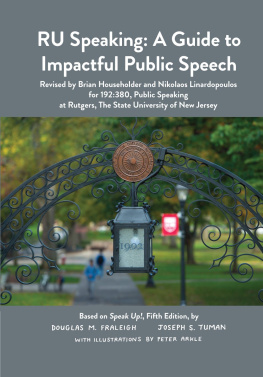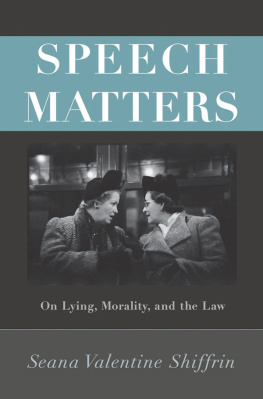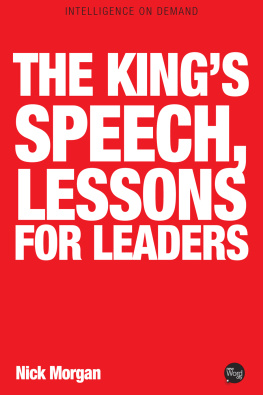Terence Cuneo - Speech and Morality: On the Metaethical Implications of Speaking
Here you can read online Terence Cuneo - Speech and Morality: On the Metaethical Implications of Speaking full text of the book (entire story) in english for free. Download pdf and epub, get meaning, cover and reviews about this ebook. year: 2014, publisher: Oxford University Press, genre: Science. Description of the work, (preface) as well as reviews are available. Best literature library LitArk.com created for fans of good reading and offers a wide selection of genres:
Romance novel
Science fiction
Adventure
Detective
Science
History
Home and family
Prose
Art
Politics
Computer
Non-fiction
Religion
Business
Children
Humor
Choose a favorite category and find really read worthwhile books. Enjoy immersion in the world of imagination, feel the emotions of the characters or learn something new for yourself, make an fascinating discovery.

- Book:Speech and Morality: On the Metaethical Implications of Speaking
- Author:
- Publisher:Oxford University Press
- Genre:
- Year:2014
- Rating:4 / 5
- Favourites:Add to favourites
- Your mark:
- 80
- 1
- 2
- 3
- 4
- 5
Speech and Morality: On the Metaethical Implications of Speaking: summary, description and annotation
We offer to read an annotation, description, summary or preface (depends on what the author of the book "Speech and Morality: On the Metaethical Implications of Speaking" wrote himself). If you haven't found the necessary information about the book — write in the comments, we will try to find it.
Terence Cuneo: author's other books
Who wrote Speech and Morality: On the Metaethical Implications of Speaking? Find out the surname, the name of the author of the book and a list of all author's works by series.
Speech and Morality: On the Metaethical Implications of Speaking — read online for free the complete book (whole text) full work
Below is the text of the book, divided by pages. System saving the place of the last page read, allows you to conveniently read the book "Speech and Morality: On the Metaethical Implications of Speaking" online for free, without having to search again every time where you left off. Put a bookmark, and you can go to the page where you finished reading at any time.
Font size:
Interval:
Bookmark:

TERENCE CUNEO


Great Clarendon Street, Oxford, OX 2 6 DP ,
United Kingdom
Oxford University Press is a department of the University of Oxford.
It furthers the Universitys objective of excellence in research, scholarship,
and education by publishing worldwide. Oxford is a registered trade mark of
Oxford University Press in the UK and in certain other countries
Terence Cuneo 2014
The moral rights of the author have been asserted
First Edition published in 2014
Impression: 1
All rights reserved. No part of this publication may be reproduced, stored in
a retrieval system, or transmitted, in any form or by any means, without the
prior permission in writing of Oxford University Press, or as expressly permitted
by law, by licence or under terms agreed with the appropriate reprographics
rights organization. Enquiries concerning reproduction outside the scope of the
above should be sent to the Rights Department, Oxford University Press, at the
address above
You must not circulate this work in any other form
and you must impose this same condition on any acquirer
Published in the United States of America by Oxford University Press
198 Madison Avenue, New York, NY 10016, United States of America
British Library Cataloguing in Publication Data
Data availableLibrary of Congress Control Number: 2014930366
ISBN 9780198712725
ebook ISBN 9780191053689
Printed and bound by
CPI Group (UK) Ltd, Croydon, CR 0 4 YY
Links to third party websites are provided by Oxford in good faith and
for information only. Oxford disclaims any responsibility for the materials
contained in any third party website referenced in this work.
For Niko, who is learning to speak
A prominent philosopher once expressed to me his view that philosophers should, every five years or so, distance themselves from their area of specialty to develop a new one. The idea behind this approach, apparently, is that it protects philosophers work from becoming stale. Were it followed, there would be much less temptation to repeat oneself or to get stuck in a theoretical rut. In the ideal case, we philosophers would have new things to say about fresh topics.
For all I know, this might be excellent advice. But I have failed egregiously to follow it. Whether that is because I am a creature of habit or because of the magnetism of the ideas about which I find myself thinking, I cannot tell. However that may be, this book is not an attempt to say new things about fresh topics.
But it is an attempt to say some new things about a familiar topic. For my project in this book is to offer an unfamiliar argument for a familiar position, namely, moral realism. When I say that moral realism is a familiar position, I mean two things. Moral realism is, in the first place, long familiar to the philosophical tradition (although, of course, it has not always had a name or been called moral realism). It is also a position with which I am well familiar, having developed an argument for it in a previous book. In the Introduction, I lay out my reasons for thinking that it is worth developing another argument for moral realism. Here I would like to emphasize that while this book and its predecessor develop different arguments for moral realism, they are animated by a common conviction. Both books press the case that morality is ubiquitous, showing up in and having implications for areas that many philosophers have not supposed it would.
The main idea I develop in this book is that one such area is speech. Speech, I maintain, is a thoroughly normative phenomenon: one performs speech acts such as asserting, promising, and commanding, I claim, by altering ones normative position with regard to ones audience, acquiring rights, responsibilities, and obligations of various sorts. Reflection reveals, I further claim, that some of these rights, responsibilities, and obligations, are moral. Indeed, I argue, they are as moral realists say. Although I have relatively few Kantian tendencies, the main argument I develop could be described as being transcendental, as it implies that a necessary condition for the possibility of speech is that there be moral facts of certain kinds.
I do not believe that this argument itself vindicates moral realism in the sense that one cannot reasonably reject one or more of its premises. It is better viewed as part of a larger, overarching case to be made in realisms favor. On this occasion I have not attempted to lay out this more general case, choosing instead to focus on one argument that, in my judgment, presents both an interesting case for realism and a challenge to rival antirealist positions. In most instances, I should note, I do not find these rival antirealist positions to be obviously false, especially in their most nuanced and sophisticated forms. But I do find most of them unsatisfactoryand some of them deeply unsatisfactoryin important respects. Part of my aim here is to try to highlight some of the respects in which these views are unsatisfactory. I am especially inclined to put pressure on a line of thought that I encounter rather frequently, which is that the rejection of moral facts is relatively innocuous, as it would not have widespread theoretical or practical implications. I believe that this line of thought is mistaken. In my judgment, if there were no moral facts then we would not be able to speak.
I remain fully aware, of course, that moral realism is a deeply contested position that many excellent philosophers reject. I call attention to this fact not because it distinguishes realism from other philosophical positions; most other substantive philosophical views are also hotly debated and rejected by some excellent philosophers. Rather, what distinguishes realism from most of these other views is that, unlike advocates of these other contested philosophical positions, realists ordinarily believe that it matters a great deal whether their view is true. It is important, realists hold, that our ethical choices and appraisals can be mistaken or improved because they fail to answer to moral standards not of our own devising. And it is important that our ethical disputes can be decided by not the exercise of power or whim but by the apprehension of how things are morally. If realists are right about this, then the awareness of moral reality should make a difference to how we live and view our lives and evaluate the lives of others. At any rate, it is in this regard that many realists believe that their view is different from other highly controversial philosophical positions, such as four-dimensionalism or presentism, which bear only a very indirect relation to how we should view and live our lives and evaluate the lives of others.
Although realists ordinarily believe this, they do not have the luxury of recommending their position on prudential grounds, citing the ways in which its acceptance will bring meaning or fulfillment to ones life. Nor can they plausibly suggest that there is a set of ascetic disciplines or experiments in living that will place one in a better position to see its truth, as the ancient Stoics believed about their views. The best that can be done is to develop a wide-ranging and fairly abstract case in its favor. My project in this book is to contribute to such a case.
Font size:
Interval:
Bookmark:
Similar books «Speech and Morality: On the Metaethical Implications of Speaking»
Look at similar books to Speech and Morality: On the Metaethical Implications of Speaking. We have selected literature similar in name and meaning in the hope of providing readers with more options to find new, interesting, not yet read works.
Discussion, reviews of the book Speech and Morality: On the Metaethical Implications of Speaking and just readers' own opinions. Leave your comments, write what you think about the work, its meaning or the main characters. Specify what exactly you liked and what you didn't like, and why you think so.







